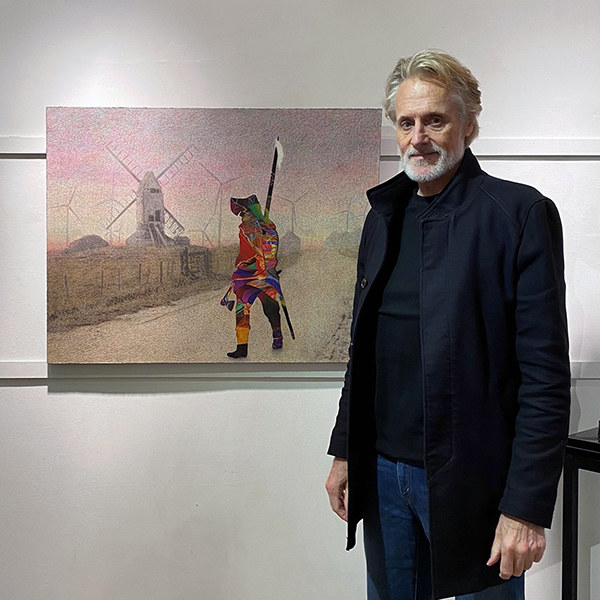This show is now over. If you have seen something of interest at this show and wish to inquire, please contact the gallery.
Duncan Regehr was born in Lethbridge, Alberta in 1952 and raised in Victoria, Canada. As a child he was encouraged by his father, artist Peter Regehr, to develop his talents. He later studied painting with Dutch surrealist Henry Poesiat. His studies also included literature, psychology and sociology.
His work of the last thirty-five years in the visual, performing and literary arts has evolved to establish him as a prolific multi-media artist of international prominence. Numerous art exhibitions in Canada, the USA, Britain and Europe have attracted the attention of museums, critics and the public. His paintings and written works are found in important collections worldwide.
Through the evocative and authoritative insights of his paintings and poetry we have come to know Regehr as an artist of great sensitivity. He possesses a rare ability to assess, analyze and reveal the complexities of life, culture, history and myth. His beautifully painted canvases, sculptures, and drawings are imbued with a deep, ageless quality. We sense the hand of an artist who invests his work with emotional intensity, exposing compelling images that are idiosyncratic and profoundly human in nature.

Lost Man

The Lost Man is a series of paintings consisting of individual pictorial narratives and themes. Each piece portrays a solitary male figure who occupies space within the environment yet appears to exist separate from its reality. Colours and abstractions of his essence prevail, not lost or faded but vibrant within his form. Background environments, rendered in greyish tones, appear remote and out of focus.
The Lost Man has not lost himself; rather it is society that has lost the man.
I began work on The Lost Man in the spring of 2019. The overall concept for the series arose from the observation that men have been experiencing alienation, rejection of male values and a gradual erosion of essential masculinity for some time.
As work progressed, my understanding of the series extended to include the view that people everywhere are experiencing severance from reality. We embrace the superficial isolate through texting and social media and disconnect through fake news and reality TV. The more we empower artificial intelligence, “virtual” reality and automation the more we lose touch with our selves, each other, our environment and Nature. DR
The Forgotten Woman

Ideas for The Forgotten Woman began germinating during development of The Lost Man. Paintings started to arrive late in 2019, just prior to the Pandemic.
Women need to remember their own forgotten woman – Anne Graves.
Many pass through the world having hidden, quelled, or sacrificed essential aspects of self, and by choice or by force of circumstance adopt alternative ways of being. Some leave behind the spirit they knew well in childhood. Some retain a secret self. Others remain invisible to themselves throughout life. Unacknowledged and unobserved by the world, they are forgotten…anonymous.
Contrasting colour schemes are integral to the theme of “The Forgotten Woman”. Female figures appear separated from their environments, yet suspended within them. Their colorful essence contained in silhouette. Remote, grisaille-like backgrounds magnify their vibrancy. As with “The Lost Man”, the vivid figures are the polar opposites of their surroundings.
With the emergence of Covid-19 both series seem a timely creation; perhaps a harbinger of what was to come. Now, more than ever, people are experiencing social distancing, isolation, separation from society and from everything that we once knew as “normal”.
Courage, compassion, perseverance and hope carry the potential to ease our confinements and addictions; to help us find novel ways of re-engaging our human calling as social beings, to find our way as creators, explorers and survivors.


You must be logged in to post a comment.